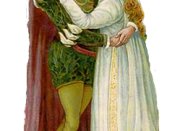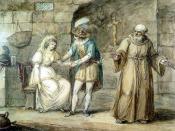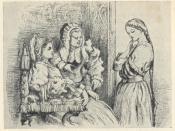Haste is a major theme shown throughout William Shakespeare's play, Romeo and Juliet. Many of the characters were impetuous in their actions and as a result, the consequences were tragic. Lord Capulet was too eager in his desire for Juliet's marriage to Paris, which later led to her betrayal. Romeo's rash decision to fall in love with Juliet soon became fatal. Juliet's impulsive decision to avoid marriage ended her own life. Haste effected the tragic ending of Romeo and Juliet through the decisions of Lord Capulet, Romeo and Juliet.
Juliet's father, Lord Capulet, effected her life by making decisions too rapidly. Paris, a suitor for Juliet, wished for their wedding to be as soon as possible. Although at first Lord Capulet told Paris to wait, later he forced marriage upon his daughter Juliet. Instead of thinking of Juliet's feelings, Lord Capulet agreed on the marriage and when she faked excitement towards marrying Paris, Lord Capulet put the wedding to a sooner date, saying, "O' Thursday, tell her, she shall be married to this noble earl.
Will you be ready? Do you like this haste?"( III, V, 22-25) Later, Capulet put the wedding date in further haste saying, "Go, nurse. Go with her. We'll to church tomorrow"(IV, II, 38), therefore interfering with Juliet's plan for a fake death, which later ended in her and Romeo's actual death.
Although Lord Capulet's rashness effected the outcome of Romeo and Juliet, Romeo made desperate and impetuous decisions. When Romeo told Friar Lawrence about his love for Juliet, he had only known her for a short while, therefore the Friar's response was "Wisely and slow, they stumble that run fast"(II, IV,94), but agreed to marry them anyway. During the ceremony, the Friar again commented on the sudden haste, saying, "therefore love moderately,


